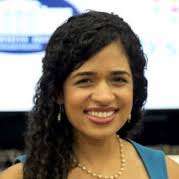Maya Shankar
Maya Shankar is Global Director of Behavioral Science at Google since March 2017. [3] Shankar is a former violinist, founded The White House Social and Behavioral Sciences Team in 2015. She served as an advisor in the White House Office of Science and Technology Policy while on a fellowship from the American Association for the Advancement of Science.[4] Shankar also served as a United Nations Senior Adviser on Behavioural Insights.[5] She served as a visiting research scholar at Princeton's Center for Behavioral Science and Public Policy in the fall of 2016.[5]
Maya Shankar | |
|---|---|
 | |
| Senior Advisor at the White House Office of Science and Technology Policy[1] | |
| In office April 2013 – January 19, 2017 | |
| President | Barack Obama |
| Chair of Social and Behavioral Sciences Team[1] | |
| In office September 2015 – January 19, 2017 | |
| First Behavioral Science Advisor to the United Nations | |
| In office January 2016 – October 2016[2] | |
| President | Secretary-General of the United Nations Ban Ki-moon |
| Global Director of Behavioral Science at Google | |
| Assumed office March 2017 | |
| Personal details | |
| Spouse(s) | Jimmy Li |
| Alma mater | Yale Oxford Stanford |
Maya Shankar is the daughter of Ramamurti Shankar, Indian physicist and Yale University Professor.[6]
Education
Maya earned her B.A. from Yale University in Cognitive science and went on to earn her Ph.D from the University of Oxford on a Rhodes Scholarship. In 2013 Maya went on to complete her post-doctoral fellowship in Cognitive neuroscience at Stanford University.[7] She is a former graduate of the Juilliard School of Music pre-college division and a private violin student of Itzhak Perlman.[6] When Shankar was 17, she tore a tendon in her left hand, bringing her musical career to an end. [8][9]
| Part of a series on |
| Nudge theory |
|---|
|
Social scientists |
|
Government programs |
|
Government agencies |
|
Related concepts |
|
Nudge theory in business |
References
- "White House Author: Maya Shankar". The White House. Archived from the original on January 1, 2017. Retrieved December 27, 2019.
- "Secretary-General Meets UN Adviser on Behavioural Insights". United Nations. Retrieved 2016-12-12.
- "Maya Shankar". LinkedIn. Retrieved December 27, 2019.
- Thaler, Richard. Misbehaving: The Making of Behavioral Economics. p. 344. ISBN 978-0-393-35279-5.
- "Maya Shankar Joins Center as Research Scholar". 2016-10-18. Retrieved 2018-04-30.
- "How Do You Get to Camp? Practice, Of Course; Teenagers Who Play Music, Not Tennis". New York Times. June 27, 2002. Retrieved December 27, 2019.
- "Maya Shankar | SIEPR Policy Forum". stanford.edu. Archived from the original on April 25, 2017. Retrieved December 27, 2019.
- "Why We Do What We Do". End Well. March 27, 2019. Retrieved December 27, 2019.
- "Loss and Renewal: Moving Forward After A Door Closes". NPR. December 31, 2018. Retrieved December 27, 2019.